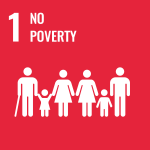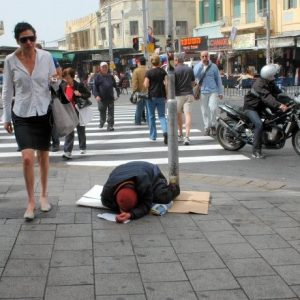 Goal 1: No Poverty
Goal 1: No Poverty
END POVERTY IN ALL ITS FORMS EVERYWHERE
Research Poverty in Israel is steadily on the rise with nearly 2 million people living below the poverty line, approximately 20% of which are children. The Interdisciplinary Center for the Study of Poverty and Social Exclusion encourages new research efforts; development of unique research methodology; as well as collaboration between researchers, policy makers, business representatives and community leaders.
Poverty in Israel is steadily on the rise with nearly 2 million people living below the poverty line, approximately 20% of which are children. The Interdisciplinary Center for the Study of Poverty and Social Exclusion encourages new research efforts; development of unique research methodology; as well as collaboration between researchers, policy makers, business representatives and community leaders.
Prof. Roni Strier, from the Faculty of Social Welfare and Health Sciences, is the Chair of the Interdisciplinary Center for the Study of Poverty and Social Exclusion, as well as Head of Leadership and Social Change MSW Track. His vast research focuses on the working poor in Israel, poverty and gender, poverty and nationality, and social services in mixed cities in Israel. A second area of inquiry refers to the impact of neoliberalism on different areas of social work such as social work education, nonprofit organizations, public welfare services, moral distress and policy practice.
Public Engagement
In a world where corporations are increasingly powerful— owning information about us and influencing our rights —new legal strategies must be developed to safeguard human rights. Our Civil Litigation Clinic provides legal aid and representation to people in poverty and debt. This year students and faculty working in the Clinic petitioned Members of Knesset with policy papers on insolvency regulation and mechanisms for erasing default interest. Since its establishment over a decade ago, the Clinic for Law and Education Policy has been fighting to ensure accessible and free education for all children. This year the clinic continued a lawsuit against a local high school for charging excessive payments from parents, above and beyond what is permitted by law.
Learning & Students
Over 90 Faculty of Law students from University of Haifa run the Clinics for Law and Social Change. The legal clinics are a “laboratory in law,” where experience and expertise are translated into research that is later published in leading academic journals, both Israeli and international.
Ensuring access to education through digital learning, the MOOC – Massive Online Open Course was developed by UofH’s Unit for Digital Learning. The courses are run using the edX and Israel Digital Campus platforms. Anyone can register for courses for a nominal fee, and those who choose can have the courses recognized for credit. During COVID-19, the MOOC was essential in helping the transition to digital learning.
Operations
Over 1.5 million shekel, approximately $500,000 was distributed in scholarships and financial assistance to 565 students through the Student Solidarity Fund, established by the University of Haifa to support individuals struggling with extreme economic hardship due to COVID-19.
UofH took significant steps to improve the university’s employment conditions for its contracted maintenance staff. The majority of cleaning services in Israeli academic, health, and cultural institutions are employed through outside contractors. President Ron Robin implemented a plan that allows University cleaning staff to be recognized as employees, thus protecting their rights and allowing them to attain financial security in the future.

